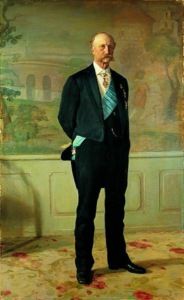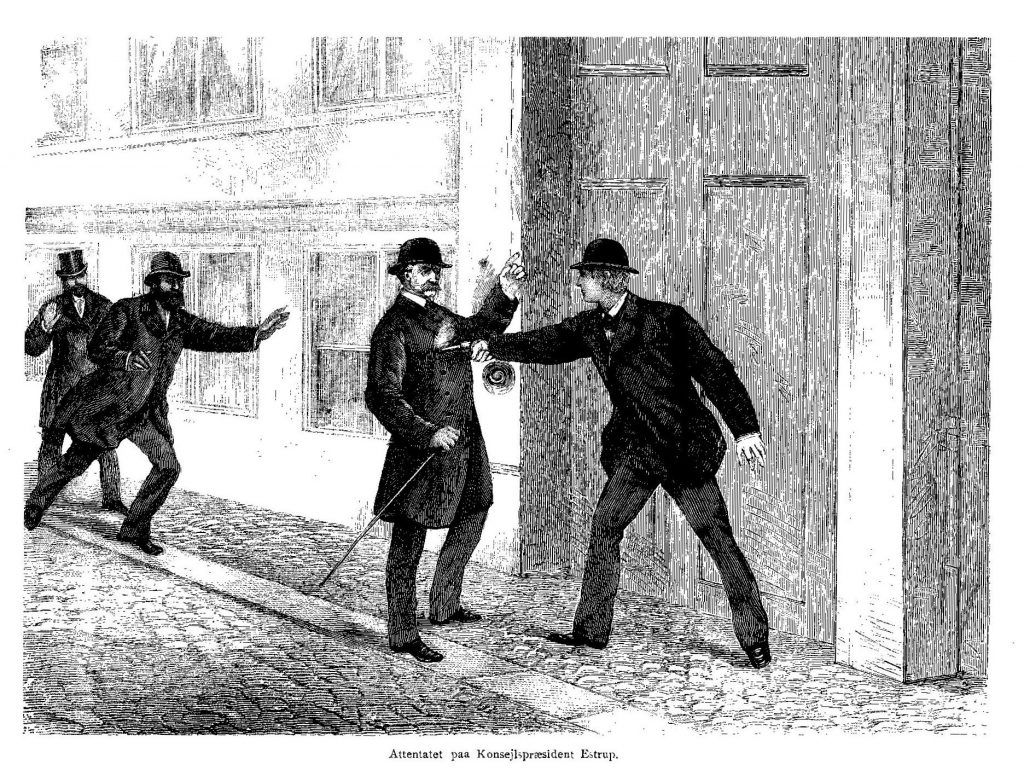No matter how much they lampoon and criticise each other, politicians would never resort to killing each other – or at least in Denmark!
But times were different back in 1885 when, were it not for a stroke of good fortune, a disaffected idealist could have succeeded in his attempt to murder the then prime minister, JBS Estrup.
Defences over desperate citizens
In 1875, JBS Estrup became PM of a government that consisted entirely of his Conservative colleagues. This was in stark contrast to other governments of the time, which comprised ministers from a cross-section of the political spectrum. One of the pledges from the new government was to spend a large proportion of its budget extending the defences of the capital by building a massive fortress-like complex around the city.
The proposals looked likely to cost a lot of money and the then opposition party, Venstre, was strongly opposed to the plan. Venstre leader Christian Berg pointed out that many citizens of the capital were living in desperate conditions and that their welfare should take priority. He and his colleagues began working hard to block parliamentary approval of the proposal. Berg’s political posturing meant that the PM was thwarted in his attempts to gain parliamentary approval for his proposals.
The ticked off typographer
Work had not yet started on the ambitious project when the general election of 1884 ended in defeat for the government. However, to the outrage of his opponents, Estrup’s government completely ignored the etiquette of the time. In line with Parliamentary custom, the outgoing government should have quit immediately following the election, but instead Estrup first put in place a provisional law containing all the necessary changes needed for his project to extend the city’s defences to receive the green light. The government’s attempts to out-manoeuvre its rivals caused anger and resentment across the board.
One of those opposed to the actions of the ruling Conservative Party was a 19-year-old political activist called Julius Rasmussen. A typographer by trade, Rasmussen was a brash young man who had only recently become involved in politics. Deeply unhappy with the actions of Estrup and his colleagues, the 19-year-old decided to – in his own words – “strike deep at the heart of those acting in an unconstitutional manner”.
Hit the panic button … oh wait
Somehow the young idealist managed to procure a loaded revolver and with it carefully concealed, on the evening of 21 October 1885, he waited patiently outside the premier’s house in the centre of Copenhagen. When the controversial leader arrived at the door of his home, the would-be-assassin walked forward and ventured: “Are you the prime minister?” When Estrup replied in the affirmative, Rasmussen held the revolver steady and fired two rapid shots.
The prime minister was lucky. One bullet missed completely, while the other hit the metal button of his expensive jacket, leaving him unharmed. The Danish leader had escaped death due to the high quality of his apparel. It is said that Estrup then walked calmly into his apartment home, changed his clothes, and went out again to keep a dinner engagement that same evening.
Only 14 years
As soon as the assassination attempt became public knowledge, the king sent a telegram to Estrup expressing his relief that the PM had escaped unscathed. Rasmussen was arrested shortly after the incident. He made a full confession, stating that the objective of his actions had been to bring freedom back to his country. The opposition, including Christian Berg, were quick to disassociate themselves from Rasmussen’s attempt to murder the PM and many of Estrup’s political enemies attended a parade in his honour shortly afterwards. The murder attempt, ironically, increased the PM’s popularity no end.
Afterwards police described Rasmussen as essentially a kindly man, if a little rash, and not without a longing to be the centre of attention. This, some wryly observed, Rasmussen achieved for a few short weeks before being sentenced to 14 years imprisonment. Estrup lived happily for another 28 years, but his young attacker committed suicide in prison four years into his sentence.
The city centre street where the incident took place was subsequently named Esplanaden (the French for fortress) and runs through the centre of the capital.
The incident was immortalised in verse by Julius Strandberg, a poet and social commentator of the time:
And now we know about the deed, and the youth
In jail will have many heavy hours because,
he shot, in a political rage,
at Estrup, close to his own house.

















